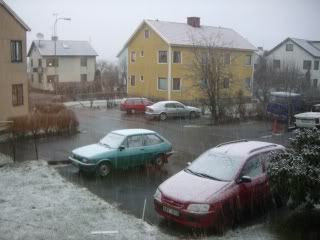
Today is Valborgsmässoafton (or Walpurgis Night in English). It’s a public holiday here in Sweden. The custom is to hold a large parade through the streets at night and light large bonfires, meanwhile teenagers loiter in public parks indulging in a bit of underage binge drinking. (I’ve noticed fears of underage binge-drinking is a constant theme in the Swedish media.) Today is also the King’s Birthday (pictured right). As an aspiring son-in-law, I made sure I sent him a card.
In some brighter news since my last blog entry, it looks like I’ve got a job. On Wednesday I’ll start work at a labourer at a construction company. Five years at university, and soon I’ll be sweeping floors at a building site. But you know what they say about beggars, and from what I gather, anyone in Sweden looking for work is a beggar. Last Saturday at the Berserkers football match (we won, match report to follow shortly), I was chatting to some of the other Australians living here, and the consensus is that finding work in Sweden is exceptionally hard. Some had been looking for 2-3 months, and all talked of going through a stage of depression where they were convinced they’d never get a job.
Language is of course a big barrier. Some of the ads I was looking at, which were for menial jobs like washing trams or lifting boxes, still required applicants to speak good Swedish. But language is not the only barrier, and many Swedes will also testify to the difficulties of finding a job. Unemployment is high, and the competition is intense. Last week there was an article in the local paper about Zara, a chain of clothing stores. They’re about to open a new store in Göteborg, and received over 1000 applicants for 85 positions as sales assistants. Last year the main conservative party got elected to government because of the wide-spread discontent over unemployment. Their first act was to slash taxes for high-income earners, and increase fees for union membership.
People I’ve been talking to seem to think unemployment is high because of the high taxes, as it is just so expensive for a company to hire anyone. One friend of Ankie’s reckons that what a company pays in an individual’s wages, they’ll have to pay again in taxes. The upside of this is that the work conditions are unbelievably good. Life might be tough if you’re unemployed, but it seems that once you do get a job you’re just showered with money and perks.
I got this job through Chris (Ankie’s sister’s fiancé), who moved here from America two months before I arrived. He tells me they get breaks every two hours, sick pay, holiday pay, all work cloths provided, and transport costs covered. They also help out with Swedish lesions, and hold regular social events. The company is also a major sponsor of the local football team, IFK Göteborg, and often gives employees free tickets to matches. Chris also says he’s often pulled aside by the foreman concerned that he is working too hard and told to take it easy. Compared to Chris’ work conditions in America, it is practically a dream job.
The company, TA Bygg, is run by a guy called Niklas, who is attempting to build up an international workforce. At first he seemed a little reluctant to hire me as I had no experience or skills, but in the end I suspect he did so because I was Australian and he didn’t have any other Australians working for him. At the interview, he said he’d spent some time working in Gold Coast a few years ago, and loved it. Claimed Australians were very friendly, and it was the second best country in the world after Sweden.
For me, finding a job is a big relief. I can still look for other work on the side, but it’s not so urgent and I’ve got time. It’s also good to get out of the International School, as some kids had taken to calling me ‘The Hangman’, because they knew that’s what they’d be playing if I took over their class. I’m also hoping to write freelance on the side too. Ohh and I’m still hopefully of convincing Princess Victoria to marry me.
In some brighter news since my last blog entry, it looks like I’ve got a job. On Wednesday I’ll start work at a labourer at a construction company. Five years at university, and soon I’ll be sweeping floors at a building site. But you know what they say about beggars, and from what I gather, anyone in Sweden looking for work is a beggar. Last Saturday at the Berserkers football match (we won, match report to follow shortly), I was chatting to some of the other Australians living here, and the consensus is that finding work in Sweden is exceptionally hard. Some had been looking for 2-3 months, and all talked of going through a stage of depression where they were convinced they’d never get a job.
Language is of course a big barrier. Some of the ads I was looking at, which were for menial jobs like washing trams or lifting boxes, still required applicants to speak good Swedish. But language is not the only barrier, and many Swedes will also testify to the difficulties of finding a job. Unemployment is high, and the competition is intense. Last week there was an article in the local paper about Zara, a chain of clothing stores. They’re about to open a new store in Göteborg, and received over 1000 applicants for 85 positions as sales assistants. Last year the main conservative party got elected to government because of the wide-spread discontent over unemployment. Their first act was to slash taxes for high-income earners, and increase fees for union membership.
People I’ve been talking to seem to think unemployment is high because of the high taxes, as it is just so expensive for a company to hire anyone. One friend of Ankie’s reckons that what a company pays in an individual’s wages, they’ll have to pay again in taxes. The upside of this is that the work conditions are unbelievably good. Life might be tough if you’re unemployed, but it seems that once you do get a job you’re just showered with money and perks.
I got this job through Chris (Ankie’s sister’s fiancé), who moved here from America two months before I arrived. He tells me they get breaks every two hours, sick pay, holiday pay, all work cloths provided, and transport costs covered. They also help out with Swedish lesions, and hold regular social events. The company is also a major sponsor of the local football team, IFK Göteborg, and often gives employees free tickets to matches. Chris also says he’s often pulled aside by the foreman concerned that he is working too hard and told to take it easy. Compared to Chris’ work conditions in America, it is practically a dream job.
The company, TA Bygg, is run by a guy called Niklas, who is attempting to build up an international workforce. At first he seemed a little reluctant to hire me as I had no experience or skills, but in the end I suspect he did so because I was Australian and he didn’t have any other Australians working for him. At the interview, he said he’d spent some time working in Gold Coast a few years ago, and loved it. Claimed Australians were very friendly, and it was the second best country in the world after Sweden.
For me, finding a job is a big relief. I can still look for other work on the side, but it’s not so urgent and I’ve got time. It’s also good to get out of the International School, as some kids had taken to calling me ‘The Hangman’, because they knew that’s what they’d be playing if I took over their class. I’m also hoping to write freelance on the side too. Ohh and I’m still hopefully of convincing Princess Victoria to marry me.






